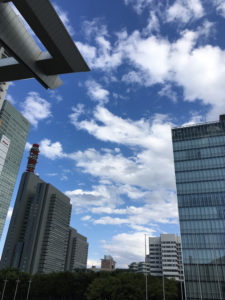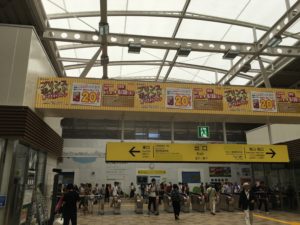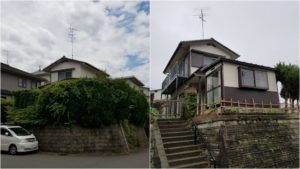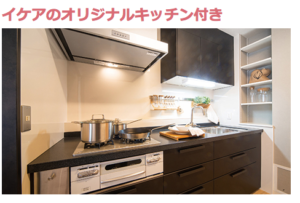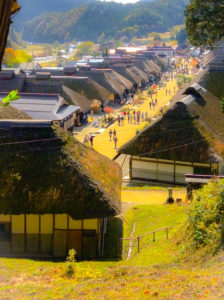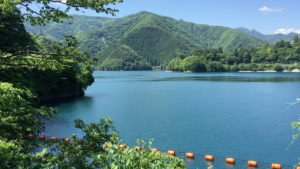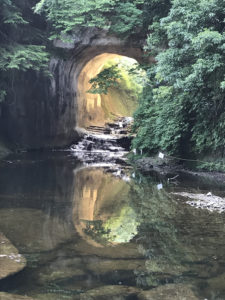
(Nomizo -no-taki(Nomizo fall), Chiba pref)
Is a tidal wave finished in Japan ? It is about time to to buy a property ?
Japan’s one of the major online web sites for the investment properties ‘Kenbiya’ recently announced the latest market trend on the properties that are registered on the site in Japan.
It is not an official report by the public sectors but the research shows the quick snap shot of the market trend.The research results cover the period between April 2018 and June 2018
on properties in Japan for each market segment.
Let’s take a closer look at the result.
Overview on all Japan
Condo unit
The gross yield of registered properties is almost unchanged at 7.69% ( minus 0.02 points compared with the previous term).
The average price fell slightly to 14.24 million yen (-3.85% from the previous term).
Residential apartment building
The gross yield of registered properties rose slightly to 8.91% ( plus 0.13 points). The average price is 67.4 million yen ( minus 2.06% from the previous term).
The average price for the apartment buildings declined for the first time since 2013.
Residential condo building
Registered yield slightly increased to 8.06% (plus 0.09 points).
The average price slightly went up to 16,329,000 yen (plus 0.66%)
Tag Archive for Tokyo
New Survey Reveals the Bank loan Is the Biggest Challenge Facing in Real Estate Investment in Japan: But investors are still bullish
Are you bullish or bearish ?
Two surveys by the major institutions revealed that both institutional investors and individual investors are bullish about the real estate market in Japan.
In the survey released by the Japanese real estate research institute in May, real estate price has been rising steadily due to the recovery of corporate performance and the expectations for the Tokyo Olympic Games and Abenomics.
The survey was conducted mainly for institutional investors.
However, 72 % of respondents say the real estate investment market is seeing the peak for the time being.
83.2% of respondents say many deals with remarkably low yields are appearing, compared to 68% in the previous survey in October 2017.
As for the view on investment in the next coming year, 90% of respondents say they will actively continue to make investments, up one point from the previous survey.
It indicates that the general consensus is still bullish.
Only 8% of respondents say they will be stopping the making new investment. Regarding the real estate market, attention is paid to interest rate trends in the United States and the monetary policy of the Bank of Japan.
As a whole investors’ willingness to invest is very positive
Regarding market expectation, the majority of institutional investors say that the market will expand in the next 6 months in both Tokyo and Osaka.Read more
Flipping akiya houses dependent on knowing costs, the local housing market : What is a key to success ?
(Tokorozawa station, Seibu line)
* Foreigners can buy a property in Japan without having special qualification.
Do you want to join the small handful of people who are doing the house flipping here ?
Maybe we have got a better solution to abandoned houses problem in Japan.
Apparently home flipping investment is a lucrative and fulfilling way to make thousands of dollars within a short period of time in US. But it can also be a difficult and frustrating endeavor when things go wrong.
And things will often go wrong. I have read about the stories that investors talk about the various obstacles in their way. Flipping homes requires hard work, persistence, and a great deal of patience,
because you’ll inevitably encounter problems in the process.
What about the flipping houses Japan ?
Since there are so many abandoned houses here in Japan, can we do something similar ?
The answer is yes and no.
Let me start with the background by quoting an article in The Japan Times.
Background
The Japan Times on December 26, 2017 says “Over 8 million properties across Japan are unoccupied, according to a 2013 government report. Nearly a fourth have been deserted indefinitely, neither for sale nor rent.
In Tokyo — where 70 percent of the people live in apartments — more than 1 in 10 homes are empty, a ratio higher than in cities like London, New York and Paris.
And that figure is expected to soar in the coming decades as deaths outpace births in a super-aging society where more than 1 in 4 people are 65 or older.
Nomura Research Institute, prominent research firm, projects the number of abandoned dwellings to grow to 21.7 million by 2033, or roughly one-third of all homes in Japan.
Meanwhile the population, which peaked nearly a decade ago, is forecast to fall 30 percent by 2065, creating an ever-increasing pool of uninhabited houses.”
Now, the real truth about the real estate investment in Japan : Kabocha no Basha and Suruga Bank scandal
In today’s uncertain economy, dynamic growth potential with low risk is tempting.
Real estate companies are constantly manufacturing the opportunities to captivate the naive investors.
Kabocha no Basha was one of them.
Suruga Bank Scandal background
Japan’s Financial Services Agency has launched an emergency inspection into Suruga Bank over investment irregularities involving women-only shared houses.
Suruga Bank extended over 100 billion yen ($915 million) in loans to about 700 people, mainly middle-aged salaried workers, to invest in Kabocha no Basha — or “Pumpkin Carriage” ; women-only shared houses operated by Smart Days.
Tokyo-based Smart Days also worked as a middle man between Suruga and investors and solicited investment from salaried workers, pledging to pay them rents for 30 years.
But Smart Days struggled with low occupancy rates and stopped paying the rents to owners they promised in January 2018.
Smart Days filed for bankruptcy in April 2018.
Where is the most attractive city to invest in Asia ? : CBRE institutional investors reports 2018

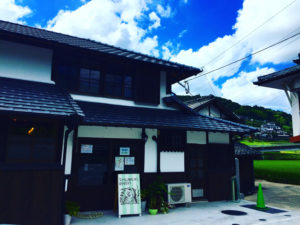
(Kamogawa city in Chiba) (Kominka-tradtional Japanese folk house-)
Are you curious about where the most attractive city in Asia to invest is ?
CBRE, renowned global real estate company, recently published a report on Japanese investment market called “CBRE Investors Survey 2018” According to the report while domestic investors’ willingness to invest remains high but the marker can see a somewhat prudent attitude and a move to seek an alternative investment.
Foreign investors targeting the Asia-Pacific region ranks Tokyo as the most attractive city and local cities (7 cities in the region such as Osaka, Fukuoka as one category) in Japan as the seventh place.
In 2018, the interest from overseas investors to Japan is expected to further grow.
Here are key points from the report
While Japanese investors have increased willingness to sell, the intention to acquire is somewhat lower.
According to the report, 63% of investors in Japan said they would acquire the same volume as in 2017, an increase of 5 points from 58% in the previous year.
Meanwhile, 29% of investors responded that they will increase from the 2017 acquisition, a 9 point decrease from 38% in the previous year.
The overall result is that more than 90% of investors are still assuming investment trajectory shall be equal to or higher than the previous year. Nonetheless, the trajectory also decreased by 5 points from 96% in the previous year. The willingness to acquire assets seems to be somewhat declining.
On the other hand, the willingness to sell is somewhat increasing.Investors who said they would sell the similar volume as the previous year, is 62%, decreased by 7 points from the previous year,34% of total said they would increase sales from the previous year, an increase of 14 points from 20% in the previous year.Overall, 96% of the total is projecting plan to sell equal to or greater than last year.
You want to flip akiya (unused house, 空き家) into a rental property in Japan ? : Please do the math first
(Flipped house in Chiba city, east of Tokyo. Before and After)
* Foreigners can buy a property in Japan without having special qualification.
Who can put a price on akiya (abandoned houses,空き家) in Japan ? You can.
There are more than 8 million distressed or abandoned houses in Japan.If you want to flip these akiya (abandoned house) into a rental property, there are quite a few opportunities out there. Akiya in Japan is a big social issue as akiya can generate serious security issues like fire, weeds, pests and burglars. Investing in akiya in a sense solves social these issues.You can find the possibilities of getting a great deal very quickly at relatively small risk exposure. But you have to find a right property in a right location.
Here is how it works
In real estate business, you probably make your money when you buy a property not when you sell it. If you don’t buy the property at the right price and/or terms, then there won’t be any good profit when you sell it.The same phrase can be applied to your home.Even if your initial plan was to live in a property (your home that is) for a long time, life is full of unexpected ventures and you may have to sell it in the future.The real estate is contained in the relatively low liquidity dimensions compared with other financial assets such as stocks, bonds and the transaction costs are high.Thus you want to be very careful when you buy a property.This is true for investors to flip a property.
Usually house flipping in the US is referred as a short-term strategy i.e. buying and renovating a house and sell it at higher value in the short term. A flipper usually needs to get out in less than six months.However, in Japan, it is not a very common style.Today I am illustrating a Japanese style house flipping; flipping akiya (abandoned house, 空き家)into a rental property.You don’t have to stick to akiya for flipping but they are naturally very affordable to come by.One of our business partners is actively investing in akiya (abandoned house).Here’s a simple strategy we usually recommend for flipping akiya into a rental property.
Location
We usually locate a property in suburban areas of Tokyo where you can find a decent one for flipping.
You should be able to find an appropriate property in Kansai (western Japan) areas but we don’t cover those areas simply because it is too far to visit the sites.Read more
Is there any hot UR apartment to rent ? : Tips for hunting nice UR property in Japan
(UR X IKEYA collaboration : IKEYA kitchen)
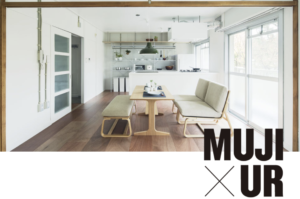
(UR X MUJI collaboration apartment in Kobe, Hyogo)
History and corporate structure of UR
It is worth knowing the background and character to deal with UR as they have started the operation as the government agency for housing.
Let me start with explaining the corporate structure and history of UR.
Their official name is ‘Urban Renaissance Agency’ (都市再生機構)and they are ’incorporated administrative agency’. (独立行政法人)
Officially speaking, they are not a part of the government organizations any more but still under the jurisdiction of
the Minister of Land, Infrastructure, Transport and Tourism (MLIT, 国土交通省)
All senior executives are amakudari from either cabinet office or MLIT.
Its capital is 107 billion yen and its number of employee is 3200.
Here is the brief history of UR.
Between 1975 and 1981
The organization provided housing and land through large-scale
development of new residential areas around major cities, which
were suffering from housing shortages due to high population and
industry concentration.
Representative projects include Chiba New
Town (Chiba Prefecture), Atsugi New Town (Kanagawa Prefecture)
and Izumi New Town (Osaka Prefecture).
Read more
A solution to the hotel shortage ? New minpaku (民泊, private lodging) law in Japan : How does it work ? and how can you tap your property ?
I have a friend who has enjoyed hosting international visitors in Tokyo in her
own condo.
She has been hosting international visitors in her spare two-bedroom apartment
but will have to stop it because her building association (管理組合)has decided to
ban the minpaku business ahead of the law’s
enactment in June 2018.
She was able to meet many different people she would have not met otherwise.
A lot of foreign friends have been asking me a question about minpaku (民泊、private lodging) in Japan.
Today I am going to discuss the basic knowledge about minpaku and minpaku law
set by the government in 2016.
How does the new minpaku law work ?
What is the implication on the real estate industry ?
Are you interested in akiya 空き家(unused house) for free in Tokyo ?:How to find a house for almost nothing in Japan ?
(Okutama lake in Okutama town, Tokyo)
You can find “abandoned houses” all over Japan, due to the country’s shrinking population.
The ministry of land, infrastructure, Transport and Tourist(MLIT) reported in 2013
that about 8.2 million (about 13.5% of total) houses and apartments were empty.
*
In fact, this 8 million number which often catches media attention is very misleading.
It includes the rooms and houses for letting.
Taking the fact into account, there are about 2.2 million akiya ‘real empty houses’ (abandoned houses)
in the market. Still daunting number in deed.
One report said vacant land and homes could by 2040 be as big as Japan’s northernmost island of Hokkaido—about 83,000 sq km (32,000 sq miles), or the size of Austria.
The area is currently about 41,000 sq km, slightly bigger than Japan’s southern island of Kyushu.
Many of Japan’s 8 million abandoned homes—or akiya(空き家)—are often left empty indefinitely.
Why do we have so may abandoned houses ?
How do you eat ramen ? -Japanese multicultural management –
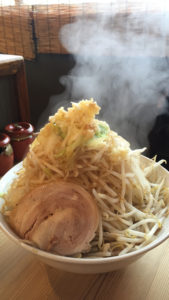
I am a licensed property broker but occasionally offered the work for the trainer who teaches the multicultural management in large Japanese corporations.
I do enjoy working as a trainer because interaction with students (workers at large corporations) is always inspiring.
Today I am going to depart from the real estate and write a light note about one of my favorite TV shows in Japan and try to give you kind of funny way of multicultural management tactics in Japan.
First of all, I don’t usually watch TV.
Why ?
1. Don’t have time to watch.
2. don’t want to spend my precious time on silly programs.
3. Generally speaking, quality of TV programs in Japan has been deteriorating significantly over years and there is not many program worth watching. (Maybe I am just getting old ?)
And yet, I do like one documentary show called ‘Youは何しに日本へ?’ (Why did you come to Japan ?) broadcasted by TV Tokyo every Monday from 6:55 pm.
(Please check your local station which is affiliated with TV Tokyo if you live
outside Tokyo)
In this show, TV Tokyo crews interview foreigners at the airport where most visitors first arrive in Japan, with no appointments. Not just at the airport, sometimes at sea ports or events, everywhere crews go there are on-the-spot interviews with no appointments (so they say anyway)
And they often find a treasure trove of funny and interesting foreigners.
It is a new type of TV document variety show with many unexpected things.
They asked tourists for the interview on the spot. It could be half-staged but looks pretty real.
Dozens of foreign tourists are interviewed and eventually a couple of persons or group are picked up
for detailed interview.
Selected tourists for in depth interviews are usually Otaku (geeks) type of people and not usual tourists.
They come to Japan for variety and yet very intriguing reasons such as eating okonomiyaki (Japanese pizza), seeing host family in Japan, learning ‘No’ play (traditional masked dance-drama)
4-day training camp of “Kenbu Tenshin-Ryu” (traditional martial arts), kimono gigs, Japanese swords fan etc etc. One episode is about a woman from America and she’s a big fan “Sailormoon” and has come to Japan to become a voice actress.Read more

